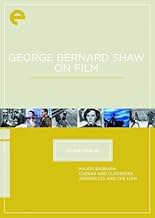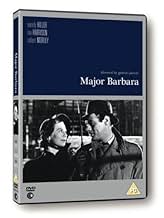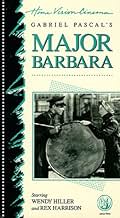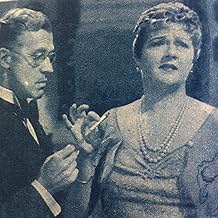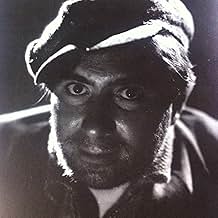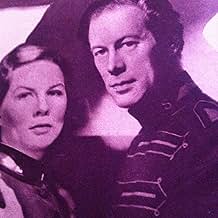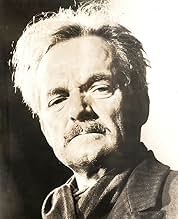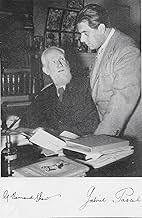Ajouter une intrigue dans votre langueA young and idealistic woman, who has adopted the Salvation Army and whose father is an armament industrialist, will save more souls directing her father's business.A young and idealistic woman, who has adopted the Salvation Army and whose father is an armament industrialist, will save more souls directing her father's business.A young and idealistic woman, who has adopted the Salvation Army and whose father is an armament industrialist, will save more souls directing her father's business.
- Prix
- 1 victoire et 1 nomination au total
Avis en vedette
The acting by all concerned, including a handsome, twinkling Rex Harrison, is STUPENDOUS!!! Another reason I have to see it again is to see Deborah Kerr as the young Salvation lass who gets clipped in the jaw...her first screen appearance. Robert Morley delivers his lines with just the proper balance of cynicism and charm!!! Orson Welles would have been too ponderous. As the Salvation Army band steps out playing "Onward Christian Soldiers", even we agnostics join in, the mood is so infectious. The point is beautifully made about the power of faith to change a person's life, even as GBS makes his points about the 'greater virtue' of providing a dignified way to make a living. I HATE black and white, except for film noir, but I was so busy mentally interacting that I never missed color. Buy it if you can, because one rental will NOT give you the full appreciation. Compared with all the wealth of information in these old movies, modern TV is sadly, just puff.
No one yet has mentioned the cinematography. I'm no student on this topic, but the scenes where Undershaft gives a tour of his factory and his vision of paradise are truly awe inspiring. There's nothing subtle in it, it is quite vivid for its time. And I think black & white is perfect here. If it were done today in color, I'm sure it would lose something. As someone else said they're not sure why the movie is a comedy. Intentional (as a comedy) or not, t could be this scene.
I haven't seen the movie in years, it is this one scene that lives on in memory above all others.
Shaw the comic dramatist is always a treat. Shaw the self-created man with all the answers is another problem. "Major Barbara" is a look at how money is made by ways that are spiritually appalling (armaments and booze for example), but which guarantee jobs and hope to people who can't get them from the world of religion. One probably can agree with this point of view, but the constant pushing of Undershaft's point of view - nobody ever trounces him in an argument - is annoying. He seems omnipotent in this play (as Shaw, no doubt, wanted him to be). I once suggested that it would have been delightful if after one of his speeches he had actually had coughed blood (to show he was mortal). But Shaw never would have done that to St. Andrew.
Yet he did do something within a decade after writing "Major Barbara" that was inconsistent. Shaw probably never willingly discussed it with anyone. Undershaft rules his armaments firm with a total control. He dictates to the government on policies he needs. The stockholders don't seem to exist. But in 1916 Shaw's optimism about dictatorial capitalists had faded. World War I shattered him a bit, and he wrote "Heartbreak House". In it is the character of "Boss Mangam", a powerful business tycoon like Undershaft, who proves to have feet of clay. It seems the great tycoon has to satisfy those stockholders or his empire is taken from him. The same, of course, has to be true of "St. Andrew" Undershaft as well. He probably is his largest shareholder, but he never says he is sole shareholder. Undershaft was quite content and pontifical in 1907 when he describes his religion of cannons and prosperity for all who listen to him. But that was peacetime. Somehow, in 1916, "St. Andrew" would probably have found it harder to be as glib about his doctrines as he had been.
Le saviez-vous
- AnecdotesFilming went on through the German Blitz. Producer and Director Gabriel Pascal had his own spotter on the roof who blew a horn when he spied German planes. According to Ronald Neame, nobody had told Wendy Hiller, so when the horn sounded during a rehearsal and everybody left, Hiller was bewildered.
- Gaffes(at around 1h 35 mins) Just before she scolds her husband for addressing her as "Biddy", a boom mic shadow passes over the lace trim on the bosom of Lady Britomart's (Marie Lohr) gown.
- Citations
Andrew Underschaft: [to son, Stephen] Well, is there anything you know or care for?
Stephen Underschaft: I know the difference between right and wrong.
Andrew Underschaft: You don't say so! What? No capacity for business? No knowledge of law? No sympathy with art? No pretention to philosophy? Only a simple knowledge of the secret that has baffled all the lawyers, muddled all the men of business, and ruined most of the artists - secret of right and wrong. Why man, you're a genius. A master of masters. A god. And at 28, too.
- Autres versionsA long final speech by Undershaft (Robert Morley) was filmed but cut before release. The National Film Theatre showed this version many years ago. The British Film Institute lists a print running 136 minutes - some 15 minutes longer than the released version - which presumably is that version.
- ConnexionsFeatured in Discovering Film: Rex Harrison (2015)
- Bandes originalesHow Sweet the Name of Jesus Sounds
(uncredited)
Music by Alexander Reinagle (1836)
Words by John Newton (1779)
Arranged by William Walton
Meilleurs choix
- How long is Major Barbara?Propulsé par Alexa
Détails
- Date de sortie
- Pays d’origine
- Langue
- Aussi connu sous le nom de
- George Bernard Shaw's Major Barbara
- Lieux de tournage
- Royal Albert Hall, South Kensington, Londres, Angleterre, Royaume-Uni(Salvation Army rally scene)
- société de production
- Consultez plus de crédits d'entreprise sur IMDbPro
- Durée2 heures 11 minutes
- Couleur
- Rapport de forme
- 1.37 : 1
Contribuer à cette page


